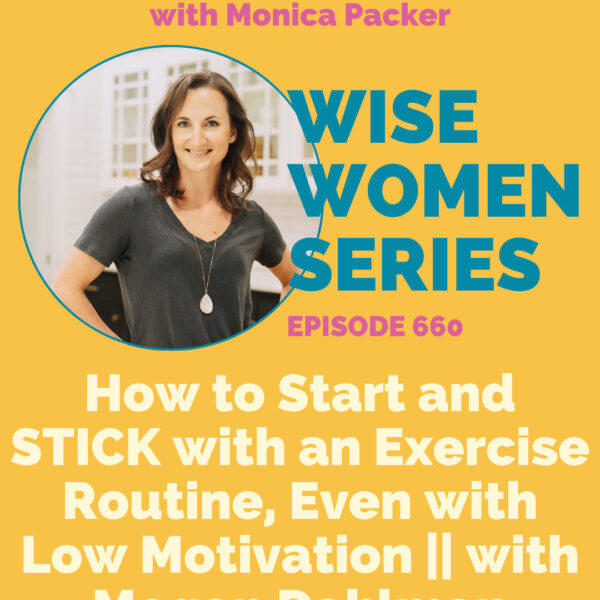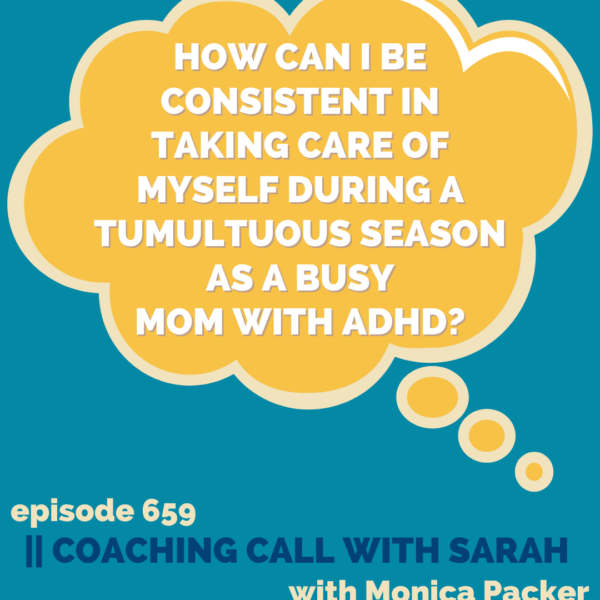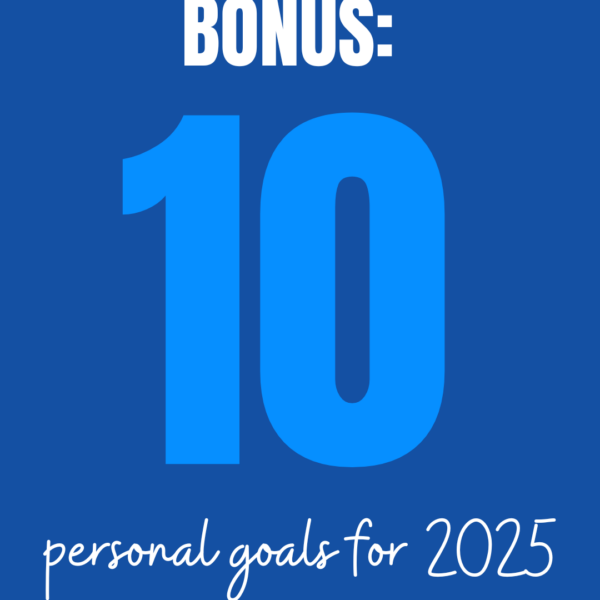Plus, how learning these things has helped me continue to show up for myself even through life’s biggest changes.
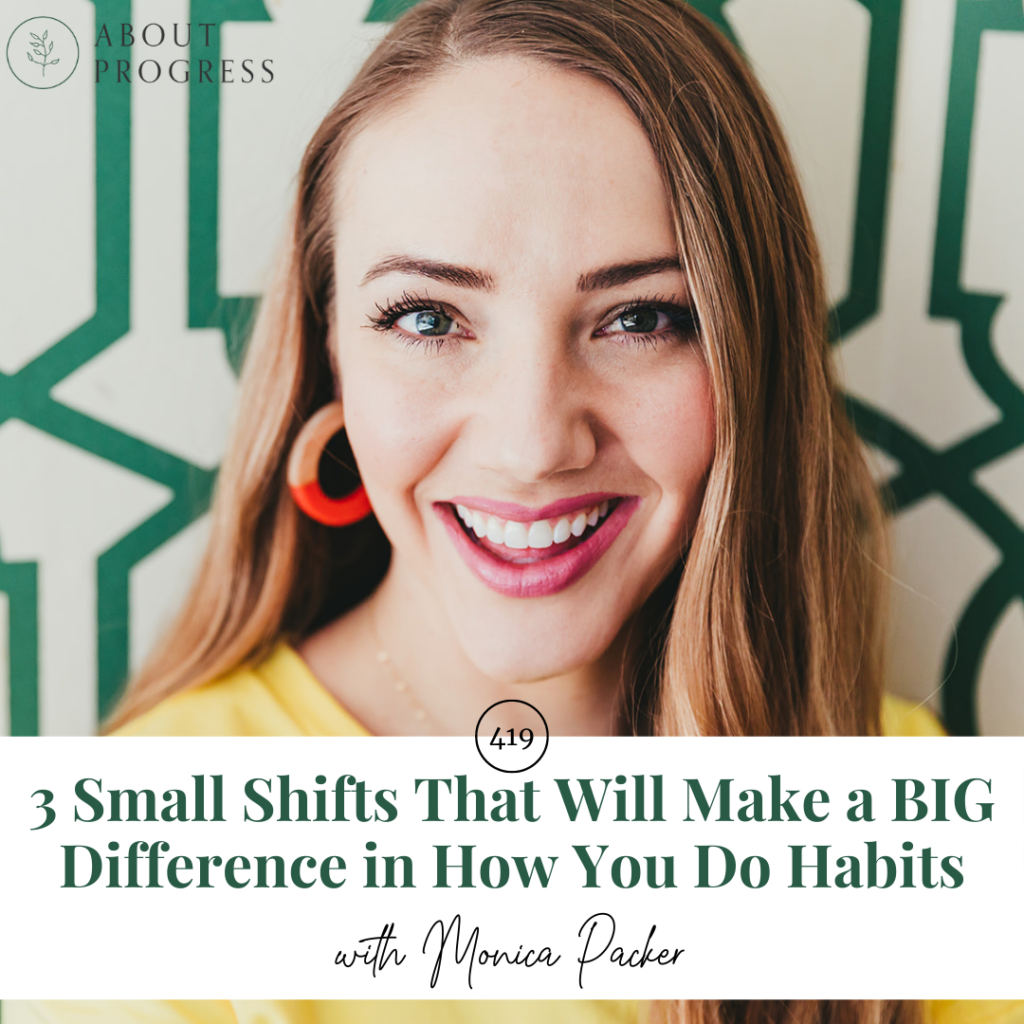
Have you ever felt like your habits are more like a ball and chain? Do they restrict you, or keep you confined, or keep you from growing in the ways you really need to? It’s time to do habits differently. In this episode I walk through several examples, including common problematic habits I hear from this community like exercise routines and regular journaling.
By letting go of the “shoulds,” you can feel free to create supportive habits that align with your values. Your habits can even fit into your life the way it is, and enhance it in ways you choose. By explaining the 3 small shifts that make a big difference, I want to empower you to take back control of your habits.
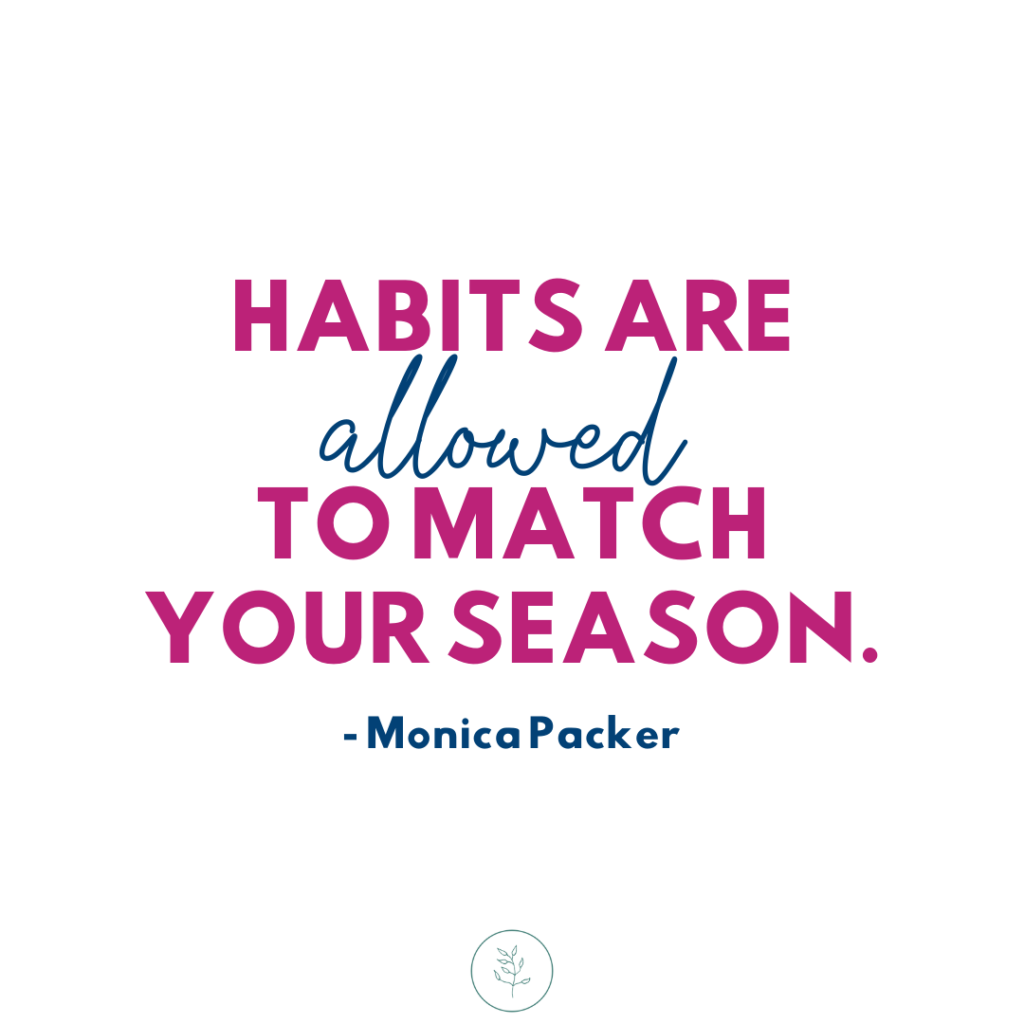
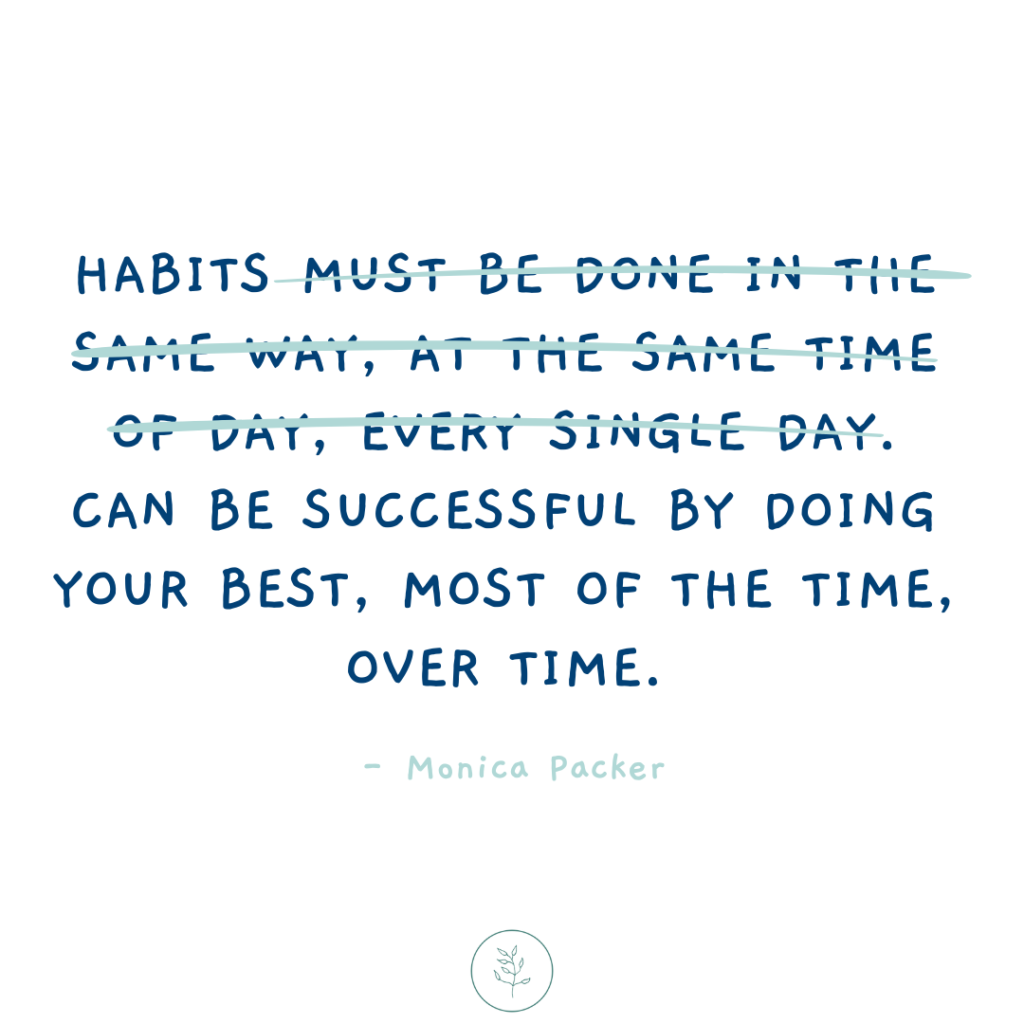
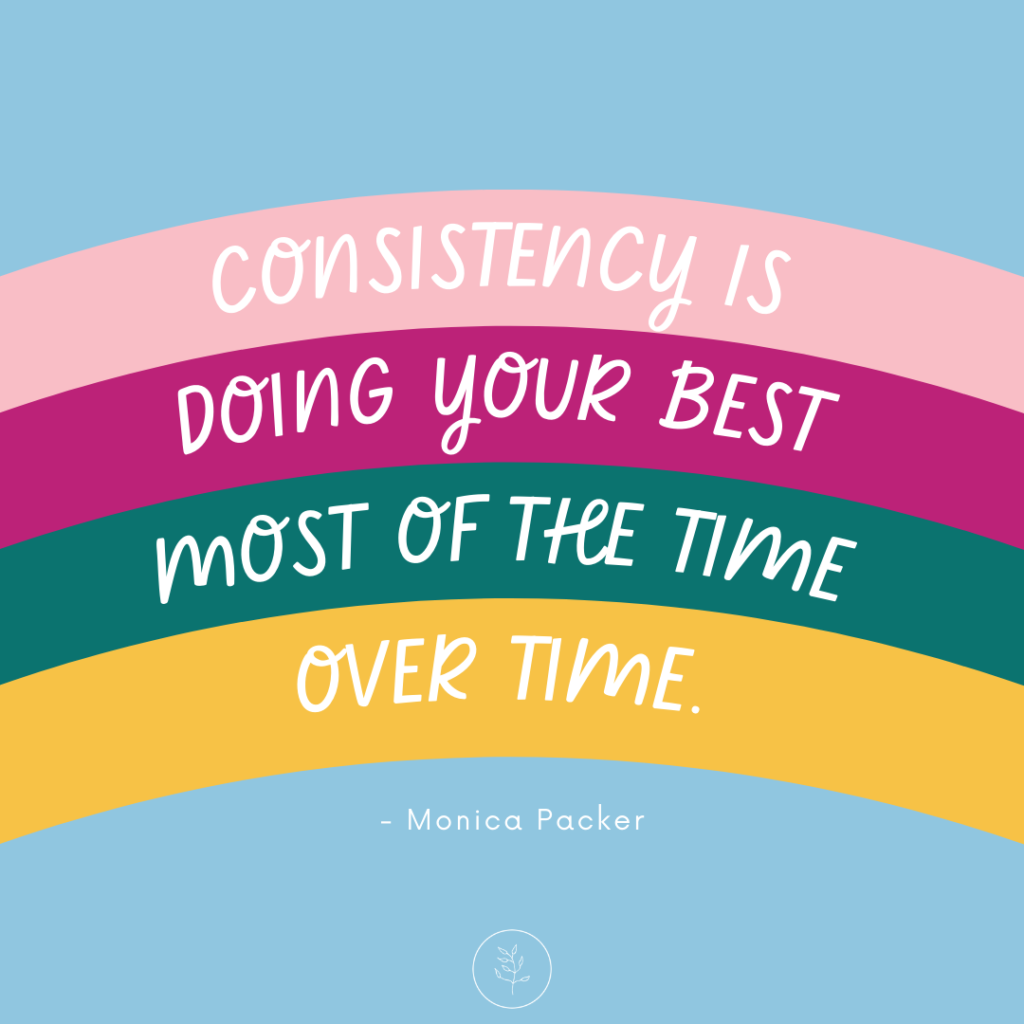
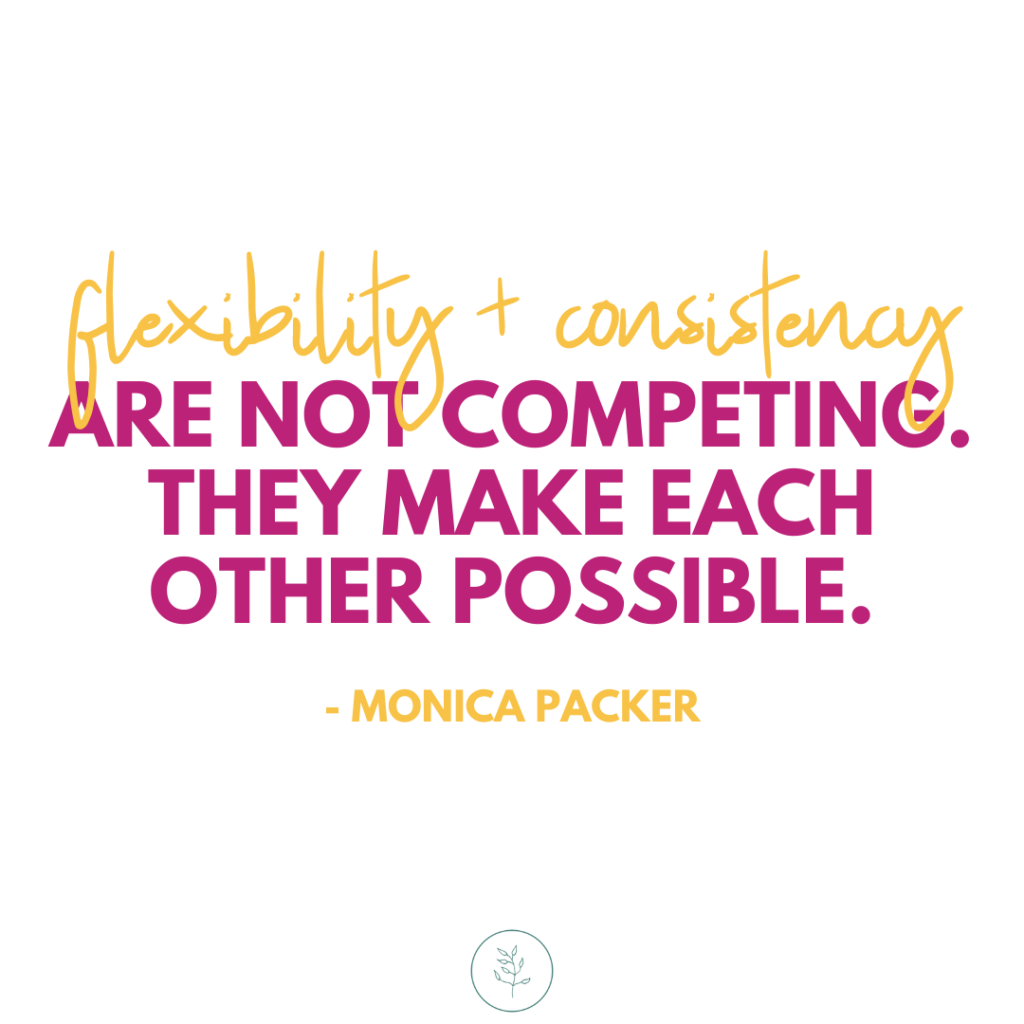
About a few other things…
Reclaim your creative power and rediscover who you actually are! If you’re ready to come back home to yourself, to be able to say that you know who you are and what matters to you, take my foundation course, “Finding Me.” It’s OK that you’ve lost parts of yourself along the way; but as you learn to anchor back into who you are and align your life to what matters to you, you’ll find that you have more strength, more fulfilment, and more creativity to bring to your important roles and responsibilities.
Sign up for the Go Getter Newsletter to get Progress Pointers in your inbox every Tuesday.
You can listen the episode below, or on Apple Podcasts/iTunes, Spotify, Youtube, Overcast, Stitcher, Pocketcasts, or search for “About Progress” wherever you get your podcasts. If you like the show please share it, subscribe, and leave a review!!
SHOW NOTES
My upcoming FREE Class
My NEW Habit Course
Foundational course, “Finding Me.”
Leave a rating and review for the podcast!
Join the Strive Hive, my monthly membership group
Lend your voice and experience + be featured on the show HERE
Join Monica on Facebook and Instagram
Songs Credit: Pleasant Pictures Music Club
TRANSCRIPT
Monica: Welcome to about progress. I’m Monica packer, a regular mom and recovering perfectionist who uncover the truest model to dramatic, but lasting personal growth it’s progress made practical. Join us to leave the extremes behind and instead learn how to do something to grow in ways that.
If you like what you hear today, then you will love my new course on creating habits. Outside of perfectionism, it’s called the sticky habit method. You can sign up by going to about progress.com/sticky habit method.
I’m officially back after my summer break and it is really good to be here. My creative juices have been flowing. And I am thrilled to be recording this episode for you today. A couple months ago, I hosted this private workshop for my strive hive members. That’s my membership group. And at the beginning of it, we were just gonna start with a general, like, I want to know how you feel about habits.
And I started that by asking them to finish this sentence. For me, “habits are…” and we sat there for a few minutes and we let those responses roll in. And this is what most of them said. Habits are difficult. Habits are diligent. Habits are super consistent and habits are impossible. I related to all of these responses because they are ways that I looked at habits for a very long time, myself.
And in my own experience, as well as my experience with coaching women for years of habit formation, I can tell you that the way we view habits and how we think we are supposed to form them, sets us up to fail. We give up too soon. We stop before we even start. Or we go about it all so wrong that we have a huge lack of confidence when it comes to forming sustainable habits, because our track record is not good.
Today I want to introduce you to three small shifts that you can make to how you view habits. And these small shifts will create a big difference in how you actually create habits and habits that stick.
The first small shift is habits are supportive. Just like my strive hive members and their response to habits are when you answer that yourself habits are what most of you will respond in ways that reflect this overall feeling we have about habits that basically mean we see them as balls and chains, that they are things we have to do that we drag around that are not for us, but that we have.
Do. And this is often because they’re built on shoulds. Like I should exercise five days a week and I should exercise in this way in order for it to count as a habit. The shoulds could also be the way that we form our habits are pretty, should driven. Like I should start a new habit with 21 28, 100 days, whatever it is that you have in mind with exact consistency in order for this habit to stick.
When we look at the shoulds, we have correlated with habits in our minds. Those shoulds feel really icky. If you sit in them for a moment, you’re not gonna feel good. You’re gonna feel drained, overwhelmed, anxious, stressed. And one of mine that’s always surprises me. Resent. Right. You’re gonna feel resentful of habits of forming them, of keeping them and resentful of the people who seem to somehow maintain it all and feel superior to us.
And it’s impossible. Right? They will feel impossible. I have a few new ways that I want you to view habit formation, but they’re not what you think they are. They’re not the ones that we’re often taught and by well-meaning people or also people who are selling things to us. Right. So let’s start with the most important one that I already gave away.
Habits are supportive. Why does that one word supportive? Make a huge difference? Tell me the difference you feel between a habit built on a should meaning some outside expectation that you’ve internalized and that habit, and one that has chosen because it’s designed to be supportive of you. Let’s take exercise as an example, you know, we all know the general health guidelines of, you know, to, to exercise.
You need to the min the minimum is to exercise three days a week for 30 minutes, but I have found that there are endless shoulds that we as women, especially correlate with exercise. What are some of yours? When you think of creating a habit that has to do with exercise, what should come up for you?
For most women those shoulds far exceed that recommendation of three days a week for 30 minutes. But even that three days of 30 minutes, there’s shoulds there too. There’s certain styles of exercise that seem to only count. There’s certain levels of intensity, of sweat involved. What are those for you? I picked exercise as an example, because it’s one of the most common ones that women bring up.
When I ask them about what habits they’d like to work on. And again, it’s the most written with shoulds. I think of all the habits that women come to me with of wanting to work with. And I’m no different. I remember back in junior high in health class, learning about exercise and we were learning about different types, aerobic.
And anaerobic. And that’s when I discovered that the way that I most consistently exercised at the time, which was dancing, was anaerobic exercise. And according to the book in front of me and the teacher also in front of me, anaerobic was okay, but we needed a lot more aerobic exercise because that’s what burned the most calories.
That’s what made us, healthier. That was definitely the way that they viewed health at the time. Right. In, in the late nineties and early two thousands, it was all about cardio burning, more and intense cardio too. Right. And, you know, just learning that fact. Built in a lot of shoulds that later had a lot of consequences for me with time.
Exercise became not just a habit, but a ball and chain in my life that really bound me and imprisoned me. It became a huge part of my eating disorders and recovery. And for years I am now, mm, 16, 17 years into my recovery. And it’s still something I have to continually look at. and how I am viewing what exercise counts.
And just as an example of this, because I knew I had to have more aerobic that meant I started, you know, running or doing roller blading. I was trying to find all the intense ways to bring aerobic in. And then when I stopped dancing, that means I had to find intense ways to do both aerobic, but then later discovered strength training was actually super important. And that turned into very long training sessions of intense cardio and intense and intense strength training for years. And this was even beyond just my eating disorder and recovery days. So exercise as a habit, wasn’t just about something that could support me.
it was about heeding these expectations that I had internalized about what counts as exercise. And if I wasn’t able to maintain that, if I wasn’t able to wake up and do the full regimen, then none of it counted in my mind, you know, any part of it just, it was all or nothing.
So if we were to have this shift of habits are supportive and we were to apply it to exercise. That gives you some freedom. And in fact, a lot of freedom, freedom to choose. What type of exercise is supportive to you? What is enough of amount of exercise that is supportive to you and the intensity that is supportive for you too? When you make that shift, you have freedom. To create a supportive habit in, in this, you know, this little bound we have of exercise that helps you actually be consistent with it because it’s supportive.
It’s not a ball on chain. It’s there to be there for you instead of you having to maintain it. When I’ve done this with women, it’s opened up a lot for them. They’ve learned that walking can count and dancing or yoga, or just taking the stairs. They’ve learned they can like go to a swim aerobics class and that be okay.
They can do it a few times a week. It’s shifted a lot for them and I’m not here to say what’s right or wrong with exercise. I actually love to work out and I love more strenuous workouts. But over the years, I have been forced to slow down and to do things differently, quite a few times, with my health and also with different seasons, whether I’m had a baby or someone sick, or we have more intense work times, and each time I’ve been forced to do things differently with my exercise, it has reminded me.
The past few years of this shift I’ve had with habits, that habits should be supportive, that I can form them in ways that are supportive and match what I want and what I need. When you make this shift, that habits are supportive it means you get to tailor design the way a habit looks in terms of the how in terms of the intensity.
And in terms of the frequency too, let’s take journaling for one more quick example, let’s say a supportive form of journaling for you is one session a week. And you typically do that, like for 20 or 30 minutes on a Sunday, because that’s supportive for the intense journaling you want to do, and it matches your needs right now too.
Or you journal for one line a day almost every day, because that feels more supportive to you right now. This small shift of viewing habits as supportive can change everything because it gives you the agency and the power to create habits that are both realistic to your life, but also enough to both sustain you and still make consistency possible.
In other words, you can make habits that meet you, your wants and your needs. Habits are supportive.
Moving on. Have you ever felt guilty because you used to be so good at a certain habit, but it’s not in your life anymore. I used to be a really religious journaler in college. It began with a college class where I was supposed to write every day for an assignment. And it turned into years of me writing a page or two almost every single night, but using full and eloquent and descriptive sentences that I was positive my posterity would be amazed to read.
This habit was so helpful and supportive to me. It gave me a place to reflect. It gave me a place to divulge. It gave me a place to process some really, really difficult and challenging times, and also gave me way to document some incredible experiences I was having in my early twenties.
But this habit abruptly disappeared, almost overnight with my marriage. And it began with this pressure I had to document every moment of our marriage of our, the day of our marriage. And I felt so overwhelmed by that. I had forgot a lot of things already. And like six months later, I was like, oh boy, I, why start now?
And then that eventually turned into pressure I want, I had inside of me to document my kids and the early years I was having as a young mom, but I was so exhausted and I was so overwhelmed, especially by the old parameters I had with journaling. I didn’t have the energy to write for that long. I didn’t have the brain power to write in that way anymore.
But then well into my progress experiment that you’ve been a part of with this podcast for now almost six years. I finally decided that I could apply the shift. I had to a lot of areas in my life with progress to journaling, and that meant that I could journal in a way that reflected my season.
In the big picture this was a supportive habit I wanted because I wanted to document, I wanted to reflect and I like the results of journaling, but the parameters I decided could finally shift to match my season. And I began by writing just one line a night and this line was an incomplete sentence. And it usually just was about what I did that day, because reflecting was too difficult for me to manage at that point in time, because I was able to have a consistent habit with writing one line a day. It became a few bullet points of incomplete sentences. And now after a few years, most times when I journal, I write a paragraph for two. Rarely more, but that has been way more than I did for years.
So now I’m so happy that I have years worths of journals from the last couple years, because I was allowed to shift to match my season.
Habits are allowed to match your season. When I say the word season, you can take this way, literally. So the way you exercise, meditate, journal, wake up, go to sleep and everything in between.
All of those things are allowed to change from winter to spring and from spring to summer. But you can also take seasonal in terms of stages of life. Habits are allowed to come for certain seasons and they’re allowed to go for others. they’re allowed to also be done differently to match your season. If there’s a habit that to you feels especially supportive and you want to keep it, but it seems so insurmountable, like, and so overwhelming and unrealistic right now.
That’s one that I would just say, shift it to match your season, change the way you do it. If there’s a habit that feels more draining and exhausting. A big giant should for you. Now that’s one where I’d say hit pause for a season, or maybe even say goodbye to that habit. All together habits are allowed to be seasonal.
And when you make that shift combined with supportive, that creates big shifts, right? Can you see them? And can you feel that already happening inside of you? Habits are seasonal.
I have one more small shift to share with you as well as a fun announcement, but first let’s take a quick break for our sponsors. To quickly recap the first small shift I want you to make in how you view habits is that habits are supportive. The second shift is habits are seasonal and the third I’m just gonna give it away.
Right here is habits are flexible. we’ve already covered how this flexibility works seasonally, right? Habits can come and go during different seasons and how we do these habits are allowed to change too, to reflect our season. But what about within a certain season? How our habits allowed to be flexible.
To talk more about that I first have to talk about the elephant in the room. And it’s consistency. We all carry a lot of ideas about what consistency looks like. I will be honest with you. Habits live and die by consistency, but not in the way that we are taught is. The habit methods out there that we’ve learned since our elementary school, days up until whatever is going on right now that you see around you.
When people teach about habits, they teach you about consistency, right? And I’m no different consistency matters, but again, not in the way you’re taught. The ways I see habits and consistency being taught is it’s 100% rigidity. It’s the same habit. Done in the exact same way. Usually at the same time of day, every single day.
Let me tell you what my definition of consistency is. If you haven’t heard it yet, consistency is doing your best. Most of the time over time, this means that consistency is allowed to be flexible. And these aren’t even competing things. Flexibility and consistency. They’re not competing. They actually make each other possible.
Now this works in the big picture with progress in any form, you know, from growth within relationships, you need to consistently do your best. Most of the time over time, this, this is true with learning a skill, improving your spirituality, whatever is important to you. That consistency will create drastic change for you over time, but let’s zoom into habits and how flexibility and consistency actually are again, not just not competing.
They are compatible. They make each other possible. The truth is, is that you cannot be realistically in this real world that we live in with real responsibilities. You cannot. Be consistent without being flexible. And this is especially true for women. And I’ll tell you more about that a little bit later.
How is this true though? How is this true for habits? Let’s go back to the definition of consistency, doing your best. Most of the time over time. Your best is allowed to shift according to your season, your best is also allowed to be differently based on what’s supportive and match is your needs and your wants, most of the time means it doesn’t have to be 100% the same every single day, day after day and over.
Is where we, we truly acknowledge and embrace the power and the gift of time and that it is its number. It’s the number one difference in progress it’s time. So let’s think about this with habits in order to be flexible enough, so you can be consistent enough to maintain a habit. You need a worst of day version of your habit.
Most often when we start a new habit, we start with the best of day version of that habit. The ideal version of the habit that we want a full page of writing in our journal each night, a Saturday afternoon of meal planning, grocery shopping, and meal, prepping a full 20 minute session for meditating or studying scripture.
I love each of these habits and I think they’re great. And I think you should have these ideals in your life, but our lives are not often ideal. A kid will throw up in the night. We will start our period. A new sport will begin just the whole family’s schedule. A boss will give you a last minute deadline.
Your health will require a lot of doctor visits. Your basement will flood. Right? All of these things will happen. So to be consistent with the habits that we want, we need to have a worst of day version in place that helps us show up so we can do our best, which is allowed to change. Most of the time over time, here are some examples, one line in a journal, eating an apple in the afternoon taking one deep breath, studying one verse of scripture. We don’t need a worst of day version because we’re weak. We need a worst of day version because we’re not robots. And the biggest irony here is that when you allow yourself to have the worst of day version, you will have the consistency.
You need to get the ideal version more often. in this community we talk a lot about breaking away from all or nothing. Now I’ve taught you a lot that all comes at a cost. And often that cost is that we resort to more of nothing. So instead we do something well, your worst of day version of the habits that you want.
That’s an example of how we apply the, do something mindset to habits. When you have a worst of day version. You can then be consistent with that habit even on the worst of day. And that means that you have both the foundation to build towards those ideals you want. And even more important to me, you have the identity of someone who is consistent at making and keeping habits.
Because those habits are designed to meet you. Your wants your needs, your season, and your day habits are flexible.
I promised you at the beginning of this episode, that these three small shifts would create big changes in the ways that you both view and form habits. Let me tell you personally how this applied to me just this past summer. I have to first start with a little surprise for you. I’m actually pregnant. I am going to be 18 weeks along when this episode air.
And that means that my intense all day, every day in quotes morning, sickness began in may early may, right during the mad end of school year rush. And it lasted all throughout our entire summer break. That meant our whole summer plans basically changed. it’s been truly a blessing of course, but also. Very honestly, with, for you it’s been very grueling and difficult on all of us and you know, most of all, I think Brad has, has felt the effects, cuz he’s born the load of both mom and dad.
The past four months, I was barely functioning until just a few weeks ago and now I’m manageably nauseous, right? So this has been a very different summer than we envisioned. And still one that we are very excited about. I want to make sure that’s clear. but while it was very difficult, I still felt supported this summer and yes, on the outside externally because my husband and my kids, but primarily, and first that support had to come internally.
And I know that from all that, I’ve learned the past many years doing this work here and largely that support. With just a few habits that helped that support feel possible. Internally habits that included slow walks in the morning when the nausea was less than the rest of the day, more regular meals, afternoon naps but even my nightly flecks of gold journaling session, and this is a journal just to document what’s going on with your kids. And I love it cuz it’s my worst of day version. Every day I can do it. But even some work habits helped me show up responsibilities there. Family rhythms also helped, like one Habit that was so essential to us surviving this summer was having a stable, full morning routine that my kids did every single day. Because that way they had the support they needed at the beginning, like things that needed to be done right away, like getting dressed, brushing teeth. Doing some chores with a dishwasher and chores around the house that all happened right away.
So they can then spend the rest of the day playing while mom lays on the couch instead of our usual outings and adventures. Okay. So, so those habits supported me. But I also had habits that were that were allowed to shift to match my season. I exercised differently. Of course I ate a lot differently, of course, but some habits went to, went away like strength training went away.
My personal journaling hit a pause until quite recently, my meditation became one deep breath a night. And all of these shifts in these pauses were not only okay, they were welcome. I made space for them to be done differently and space for others to just be hit, pause on and of the habits that remained, you know, it was almost all my worst of day versions, but that consistency of those worst of day versions still gave me the support I needed to show up differently than I normally show up, of course, but to still show up in the best of way I could.
At this time. So now that my nausea is more manageable, thankfully some habits are coming back. So I’m entering a new season. I’ve been journaling more the past few weeks personally for myself, although I was always able to keep up the flecks of gold journal. That’s for Rachel Nelson, by the way, that’s a free shout out.
I love it. This week I brought back strength training, which was hilarious because I could barely walk for a full day after it. next week I plan to meditate. and I’m also entering a busy season. We’re going back to school. I’m gonna have an uptick at my work responsibilities. I know I’ll need to wake up earlier to make those things happen.
So I have some habits I’m going to be gradually initiating the next couple weeks to work towards an earlier wake up time. Now none of this would’ve happened with other pregnancies. If I had put them in this season in other pregnancies, I forced myself to exercise the same way or other supportive habits would disappear all together because I did not allow the habits to shift, to match my season or to have flexible versions of them.
These three shifts, these mindset shifts I’ve taught you today. They’ve helped make a big difference to how I form and keep habits. And they’ve also enabled me to show up in the ways that I wanted to with different phases of my life. And I’m so grateful for those shifts. This is what habits are for my friends.
Habits are supportive. Habits are seasonal. Habits are flexible. I want you to embrace these three small shifts so that you can experience big changes too, not just for how you view habits, but how for how you form them and, and how you keep them too. I’m gonna go back to the very beginning of the story I told you about the workshop I hosted with my strive hive members.
And when I asked them to complete the same sentence. So at the beginning I asked them to answer habits are, and they shared all those, you know, horrible feelings that come up with habit formation. And that whole workshop was all about this. Like just rewiring the way that we view habits by the end. I asked them that same question.
Habits are.dot, dot, and here’s what they responded. They responded with. Supportive habits are helpful. Habits are empowering. Habits are for me, habits are life giving. If you want to experience that big shift in the way that you view habits, start with those three small shifts. Habits are support. Habits are seasonal and habits are flexible.
I hope this episode gave you the hug and kick in the pants that you need to grow. I want to end with a short invitation. The first I hinted at earlier, I talked about how women need to do habits differently. I want to invite you to the free class I am hosting on September 14th. It’s called the number one reason why women must do habits differently.
This is for you. If you are ready to stop blaming yourself for your habit fails and to do that, you need to know the truth. And the biggest truth is what I’m gonna teach you in this class, that habits fail. And it’s not your fault. I’m gonna teach you what that truth is. You can go to about progress.com/haba glasss.
And if you’re listening to this after September 14th, it’s okay. Still check out that link anyway, because I’m hoping to have a permanent recording of that class always available afterward, but it might take a little while to, to, to, to get all set up. So just keep checking. If it’s not there about progress.com/habit class that’s singular habit.
The next invitation I have for you is that I wanna hear your voice more. We have our regular dear progress episodes that are every few months, but. I want you to call in to be on the show. I wanna feature real women almost all the time, and it’s so simple. It’s less than three minutes you call in and you can ask a question.
You can share about an obstacle you’re facing you do this by going to about progress.com/call. And I give you the instructions there. I really want my episodes to regularly be responding to your real needs in real time. Some examples of how you can begin this. It can be like, Hey Monica, my morning routine is always alluding me.
Here’s how I’m struggling. Or I need help with my DSL. I get stuck on this part or even a bigger like life question, like how does fulfillment look and. For a woman like me, you know, just share, you can share the specific ones, the specific examples. You can also share the bigger questions so I can bring them on the show and feature you.
It can always be anonymous too. So again, to do that, you go to about progress.com/call in. I am so glad to be back. I’m so glad to beginning to begin to feel better. And, oh, I’m just excited for what’s to come both personally for my family. I’m also excited for what’s to come with this podcast and the things I have in store for you this fall and going into the winter too.
Thank you so much for listening now. Go and do something with what you learned today.
